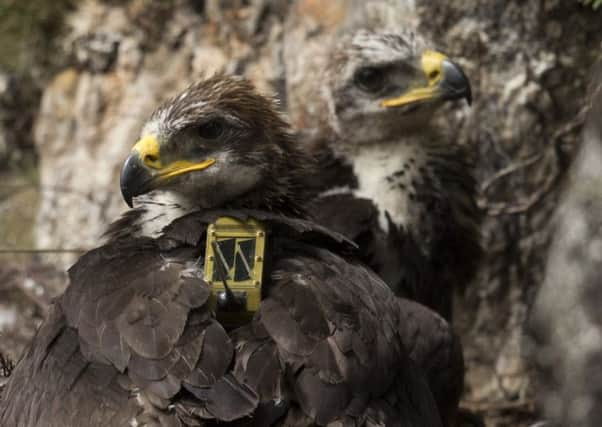Golden eagles give birth to rare triplets


The birds usually lay just two eggs, which makes the hatching of three healthy chicks all the more unusual.
“It’s exceptionally rare to have triplets with golden eagles. It’s probably only about the fifth or sixth time this millennium,” said Stuart Benn of the Royal Society for the Protection of Birds.
Advertisement
Hide AdAdvertisement
Hide AdThe trio of female chicks hatched about nine weeks ago. Providing them with enough food has been a full-time task for their parents but their hard work will pay off in a few weeks time when the fledgling chicks are expected to fly the nest.
For now, the chicks are ensconced in a nest in a pine tree about 20 metres off the ground. The RSPB is keeping the exact location a secret in order to protect the birds, but says it is in the eastern Highlands.
Mr Benn, who carries out golden eagle surveying, said: “Most nests in Scotland are on cliffs but, particularly in the east, there’s a reasonable number in trees.
“It is a pretty decent-sized nest made out of branches and twigs – probably a couple of metres across.”
There are about 450 pairs of golden eagles in Scotland, of which up to 300 a year might breed.
Mr Benn said: “Only a tiny fraction of those will lay three eggs. Over the course of three years, we’re talking about 750 to 800 breeding attempts and only one will lead to triplets.
“They grow at quite an astonishing rate. I could easily hold a golden eagle egg in my hand and it goes from that to a full-size eagle in about nine weeks.
“The parents have been pretty busy and they’re probably looking forward to a wee rest.”
Advertisement
Hide AdAdvertisement
Hide AdGolden eagles, like some other birds of prey, lay eggs several days apart and they hatch days apart too, meaning that the biggest chick gets the greatest share of the food.
Mr Benn added: “For all three of these chicks to get fed, the parents have done well.”
The chicks have now been fitted with satellite tags to help identify them as they fly off and to protect them.
Mr Benn said: “Unfortunately, there are still people who kill golden eagles in Scotland and that is one of the main reasons satellite tags are fitted to youngsters.
“It does act as some sort of deterrent to people who break the law and it allows you to detect crime.
“We would like to think these chicks have a long and happy future. Not every young bird survives but you would certainly hope one or two to live to adulthood and become parents themselves.”
The chicks will stay in the eastern Highlands for some months learning the skills they need to survive.
Mr Benn said: “We know from satellite tracking that young eagles will stay in the territory they were born in, some till the autumn, some till next spring.
Advertisement
Hide AdAdvertisement
Hide Ad“We’re not sure what dictates whether they stay for a short time or a long time – I guess it’s like teenagers: some think ‘Stay’ and some go at the first opportunity.
“Golden eagles start breeding aged four to five years. Until then, they’ll range around Scotland – we think just familiarising themselves with what else is out there.
“In time they’ll take up a territory of their own – almost certainly when an adult dies.”
With a wingspan of up to seven-and-a-quarter feet, golden eagles can live for up to 25 years and will feed on carrion and hunt hares, rabbits, grouse, ptarmigan and crows.